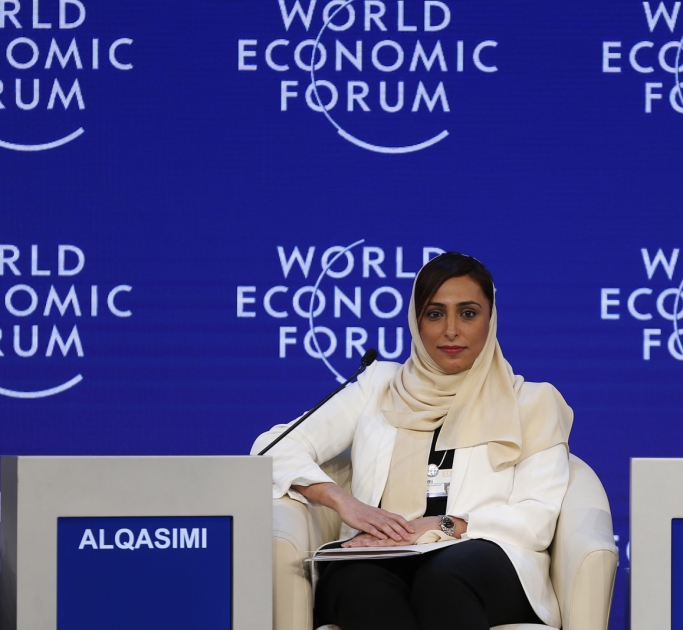
Bodour Al Qasimi: Entrepreneurs Lead the Digital Future of the Arab World
Sheikha Bodour bint Sultan Al Qasimi, Chairperson of Sharjah Investment and Development Authority (Shurooq) and Chairperson of the Middle East and North Africa Regional Business Council (MENA-RBC) -an affiliate of the World Economic Forum (WEF)- took part in the panel discussion titled ‘Going Digital in the Arab World’, highlighting innovative approaches and landmark initiatives that are being implemented by the UAE and other Arab countries to harness the benefits of the Fourth Industrial Revolution.
The session addressed how emerging technologies are revolutionising industries in every region of the world and how MENA governments are becoming more agile and inclusive in their decision making to reap the benefits of technology’s potential applications. The panelists also discussed macro and micro challenges and suggested strategic solutions that would help the Arab world move confidently into the future.
Participating with Sheikha Bodour Al Qasimi at the session, were: Mohammed Alshaya, Executive Chairman of Alshaya Group from Kuwait, Mazen S. Darwazeh Vice-Chairman, CEO Middle East and North Africa and Emerging Markets of Hikma Pharmaceuticals from Jordan and Khalid Al Rumaihi CEO of the Bahrain Economic Development Board. The session was moderated by Hadley Gamble, CNC reporter and anchor.
During the discussion, Sheikha Bodour Al Qasimi said: “I believe startups and SMEs are going to lead the digital future of many countries in the Arab world, with the exception of some countries such as the UAE, the government of which has taken a proactive approach in building smarter, digitally run cities and infrastructure. Supporting SMEs is key to our success in creating a digital Arab future.”
Sheikha Bodour also highlighted the Arab Supply Chain Initiative, a strategic initiative launched by the MENA-RBC in November 2017, which involves a voluntary business commitment to early-stage businesses by MENA-RBC members who will allocate 10 per cent of their procurement budgets annually to entrepreneurs and SMEs by 2020. The initiative aims to support smaller concerns in the MENA region to access the market, which will address one the major challenges faced by SMEs and startups in the region.
The session was attended by HRH Princess Reema Bint Bandar Al-Saud Vice President for development and planning at the Saudi Arabian General Sports Authority, HE Sultan Bin Saeed Al Mansouri Minister of Economy in the UAE, HE Nabeel M. Al Amudi Minister of Transport of Saudi Arabia, HE Ghassan Hasbani Deputy Prime Minister and Minister of Public Health of Lebanon, Ahmed Al Khoifey Governor of Saudi Arabian Monetary Authority (SAMA), and a number of experts, executive officials and MENA-RBC members were also present at the session.
The fourth day held a panel discussion about challenges and opportunities that lie ahead of Arab women entrepreneurs in the midst of the ever-changing digital technologies of the Fourth Industrial Revolution.
This came during Sheikha Bodour Al Qasimi’s participation in a panel discussion titled ‘The Rise of Women Entrepreneurs’ at the World Economic Forum (WEF), which was held under the theme ‘Creating a Shared Future in a Fractured World’ in Davos, Switzerland. The discussion assessed how from healthcare services to biodegradable products, women entrepreneurs are blazing trails and tackling market gaps.
Taking part alongside Sheikha Bodour were Rick Goings, Chairman and CEO of Tupperware Brands Corporation from USA; Arancha Gonzalez Laya, Executive Director of the International Trade Centre (ITC) in Geneva and Privahni Bradoo Co-Founder and CEO of BlueOak in USA, and Margery Kraus Founder and Executive Chairman of APCO Worldwide in USA. The panel was moderated by Randall Lane, Editor of Forbes Magazine.
“Another challenge is the absence of institutionalised child care in many countries and women are expected to play many roles if they want to pursue a start-up business. This is why female entrepreneurs’ firms are likely to be based at home because of the balance that women - especially mothers - have to create between their passion and their social duties, which limits their chances to grow a business from a start-up to a full business. In countries with higher levels of female entrepreneurship, there is a greater provision of child care services and generous family leave, allowing women entrepreneurs to develop their enterprises and business,” said Sheikha Bodour highlighting some of the challenges that entrepreneurs face.
Sheikha Bodour recommended that governments should give greater opportunities for women to manage government and semi-government organisations that support entrepreneurship in order to encourage a larger number of women to take the first step and set up their own businesses. Outlining how women are the driving change in the business sphere, she highlighted the role of Sharjah Entrepreneurship Center (Sheraa).
“We have a highly successful example in Sheraa. I strongly believe that putting women in charge of entrepreneurship policies and entities will help in closing the gap and bring more women entrepreneurs into the business world,” she said.
Sheikha Bodour Al Qasimi was invited to participate at WEF 2018 in recognition of her leading role in driving business across the MENA region. In May last year, she was elected Chairperson of the MENA-RBC in recognition of her pioneering efforts in addressing key regional socio-economic challenges around competitiveness, youth employment, entrepreneurship, education reform and peace-building, enhancing governance and improving institutional quality for inclusive growth. In her role, Sheikha Bodour is instrumental in bringing together influential business leaders from across the Arab world and enhancing cooperation between the public and private sectors to address the region’s most significant challenges.



























